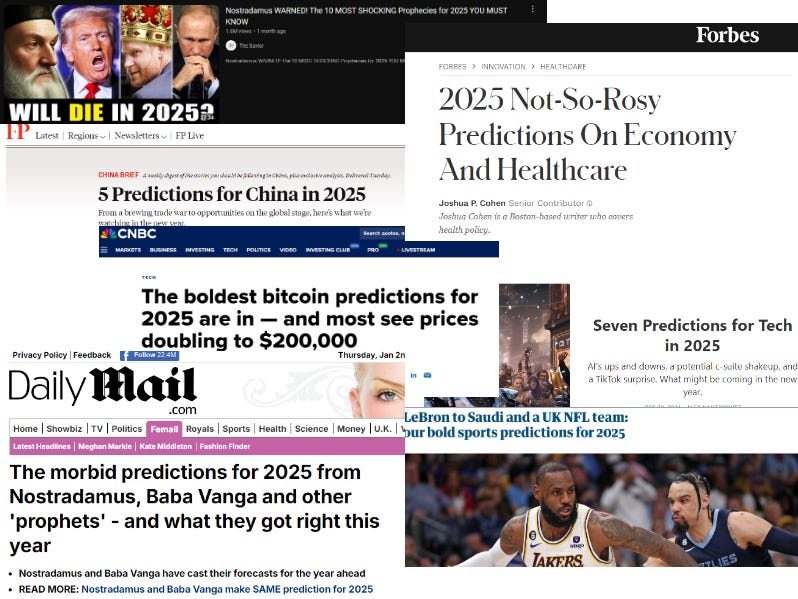Make 2025 The Year You Reclaim Your Attention
Predictions are so last year. Let's instead create a more effective framework for navigating whatever 2025 throws at us.
If you’re a consumer of online content, you’re seeing a lot of predictions right now. As a casual writer of online content, I have been tempted to add to the pile.
Here is the thing. Predictions are hard, folks. Most of these predictions you read will be wrong. The world is changing rapidly, and I don’t pretend to know where it is heading next. I do enjoy thinking of predictions as a thought exercise, but I’ll leave the articles to the professional content generators. After all, they do have bills to pay based on the attention you give to them.
I happen to value your attention, which is what I felt inclined to write about as we start the year. In this effort to be helpful rather than predictive, I am following in the footstep of Gurwinder, who wrote a very helpful article this week about 25 ideas that you may find useful in 2025. I will stick with one idea, and it is this:
Your attention is your most valuable resource.
Some of you may have heard about the attention economy, and to quote Aldo Raine, “cousin, business is booming.” There have never been more competitors for your time and attention. In a single day, a curious person is likely to encounter at least a handful of these industries hoping to get you to focus on them for a few hours at the expense of the others:
Social media: “You like to follow me because I’m just like you, except my livelihood is based on my ability to get as much engagement with this post as possible.”
Mainstream media: “Please watch these pharmaceutical ads for 3 minutes. When we’re back, we’ll tell you today’s latest example of how your political enemy is stupid and evil.”
Podcasts: “The truth is out there, let’s spend the next 90 minutes going back and forth about truth, fiction and how you can build your ideal website with Squarespace.”
YouTube and Twitch: “You know that thing you like to do? Why don’t you watch 17 videos related to that thing instead? Please like and subscribe!”
Streaming platforms: “Just spend 6 hours on one more mini-series led by an Oscar-winning actor! You know you want to.”
Sports (and sports betting): “Can Josh Allen throw a touchdown to get this 4-leg parlay to hit? Tune in to find out.”
Advertising: “Everything you do on your phone makes it easier for me to tell you which product to buy next. Thanks for playing!”
Cryptocurrency: “Don’t look away, or you will miss the next Fartcoin.”
The attention game is getting so competitive that even Netflix is beginning to alter its writing to make it easier for people to multitask. All of these businesses are trying to survive, and they can only do so by capturing more and more of your waking consciousness. I believe that this is going to reach its limit and we are entering some sort of attention bubble.
Human beings can only consume so much, before they are tempted to create, or perhaps simply exist. You should absolutely spend more time creating, existing, or giving attention to your loved ones. That is where our meaningful moments come from. In order to do that, we must learn to safeguard our attention from those incentivized to take it for their own gain.
Rebalance your active vs. passive attention
Most of the above examples are passive sources of attention vampirism. They are there for you whenever you need to take a break, but they are also designed to suck away your attention at the expense of whatever you were doing in the first place. At the end of the day, you’ll see that you spent 3 hours on your phone and have very little to show for it.
We all fall victim to this, and I’m sure there are many other ways to avoid this behavioral pattern. For my part, I would simply challenge you to rebalance your free time toward undertakings that require your active attention.
These tasks are inherently more difficult. In many cases, there is a skill involved that you need to improve at, or it introduces the possibility of failure. Regardless of how they look, they have an innate ability to improve your mental health and create personal growth opportunities. All you need to do is invest in them and reap the rewards. Isn’t that what we strive to do in our standard New Year’s resolutions?
Here are just a few examples of tasks that require your active attention:
Reading a book
Going on a walk with your partner
Writing in your journal (or on Substack)
Designing your ideal living space
Reaching out to a friend that you’ve lost touch with
Sitting in silence and seeing whatever naturally comes to mind
It is my belief that pursuing these sorts of activities will not only make you happier, but it will also better prepare you for the challenges that the world will bring you. Passive attention only prepares you for more passivity until you convert it into active attention. For example, even if you have watched 6 hours of content about surviving in the woods, you are not ready for the energy grid to go down. You must actively invest your attention by putting those teachings to practice in the real world for that knowledge to crystalize.
I hope this suggestion offers an enticing reset for some of you, but in many ways I have written this for myself. Regardless, I hope each of you have a great year ahead, and I appreciate you if you’ve read this far.

